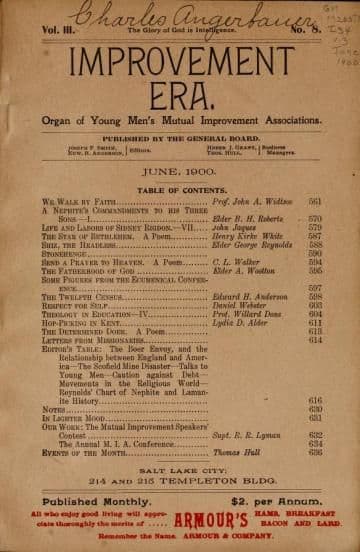Magazine
Shiz—The Headless

Title
Shiz—The Headless
Magazine
Improvement Era
Publication Type
Magazine Article
Year of Publication
1900
Authors
Reynolds, George (Primary)
Pagination
588–589
Date Published
June 1900
Volume
3
Issue Number
8
Abstract
This article discusses ridicule given to the Book of Mormon concerning the death of Shiz and Coriantumr’s race for the rulership of the Jaredite nation.
Shiz—The Headless.
By Elder George Reynolds, Author of "The Story of the Book of Mormon," "Chronological Chart of Nephite and Lamanite History," Etc.
Those who are fond of finding fault with the Book of Mormon, and they are many, are disposed to ridicule some of the incidents therein given, connected with the death of Shiz, the rival of Coriantumr for the supreme rulership of the Jaredite race during the last days of that degenerate people. The war, which at its commencement found the Jaredites a nation many million strong, was carried on with such relentless ferocity, that, at its close, the two contending monarchs, Shiz and Coriantumr, alone remained. Then followed the death of Shiz. The story of his last moments is thus told by Moroni, in his abridgment of the writings of the Prophet Ether:
And it came to pass that when they had all fallen by the sword, save it were Coriantumr and Shiz, behold Shiz had fainted with loss of blood.
And it came to pass that when Coriantumr had leaned upon his sword, that he rested a little, he smote off the head of Shiz.
And it came to pass that after he had smote off the head of Shiz, that Shiz raised upon his hands and fell; and after he had struggled for breath he died.
There is nothing so wonderfully strange about this, that it should excite contempt or even ridicule. Recorded instances are numerous of men who were suddenly decapitated, showing signs of vitality and will power as did Shiz, for several seconds after their heads were cut off. This is more especially the case when they are intensely wrought up, as he was, in the hatreds and excitements of actual combat. One instance which we have noticed is referred to in the Popular Science Monthly, p.116, for June, 1892. The writer, Geo. L. Kilmer, says:
On the 17th of June,(1864?) in the charge of the Ninth Corps on the Confederate works east of Petersburg, a sergeant of the Fifty-seventh Massachusetts leaped upon the parapet, and, with his cap in his left hand and his musket in his right, stood cheering and gesturing with his arms to incite his comrades to come on. Suddenly a shell took off his head as completely as a knife could have done, but the tall form continued erect for some seconds, the arms still waving frantically but with ever-lessening sweep and power, until the forces of the body collapsed, when the headless trunk toppled over to the ground.
Again, Hawthorne relates that a sea captain once told him of an incident which was said to have occurred during the action between the Constitution and the Macedonia, which was fought during the war of 1812, between Great Britain and the United States. The captain was, at the time, powder-monkey aboard the Constitution, and saw a cannon shot come through the ship's side. A seaman's head was struck off, probably by a splinter, for it was done, he said, as clean as by a razor, without bruising the head or body. The unfortunate man, at the time of the occurrence, was walking pretty briskly, and the captain affirmed that he kept walking onward at the same pace, with two jets of blood gushing from his headless trunk, till, after going about twenty feet without a head, he sank down at once with his legs under him.
A telegram received from South Africa, on February 1st, of the present year says:
A curious incident is related of the fighting at Spion Kop [between the British and the Boers] on January 24. One of the soldiers of the English Lancaster Regiment, while firing as he lay face downward, had his head taken clean off by a shell. To the amazement of his comrades, the headless body quietly rose, stood upright a few seconds, and then fell.
This last example is almost a perfect parallel to what is related of Shiz. And so, if necessary, instances could be multiplied where men have shown for a few moments vitality equal to that attributed to Shiz by the sacred historian; when they, like him, had, by the fortunes of war, been deprived of their heads.
Subject Keywords
Bibliographic Citation
Terms of use
Items in the BMC Archive are made publicly available for non-commercial, private use. Inclusion within the BMC Archive does not imply endorsement. Items do not represent the official views of The Church of Jesus Christ of Latter-day Saints or of Book of Mormon Central.